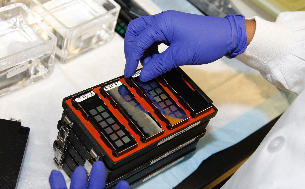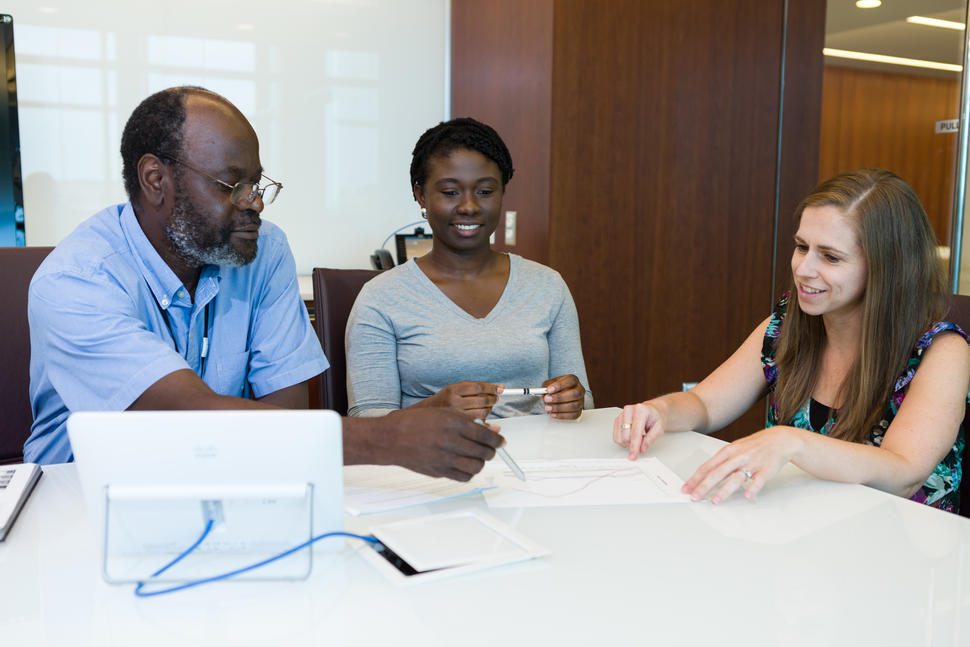Applying DCEG Expertise to Study the Global Pandemic
, by DCEG Staff
As the world of public health research responds to the rapidly evolving pandemic caused by the novel coronavirus, investigators and staff across the NCI are engaged in research activities on COVID-19. In addition, NCI staff has continued to support participants in our clinical studies, individuals living with cancer, and cancer survivors. Read about the many ways in which the NCI is collaborating on the effort to respond to the pandemic.
Within DCEG, activities have focused on three primary functions: meeting the needs of participants in our family studies, applying our epidemiology expertise through collaborations, and conducting genomic studies to identify genetic alterations associated with good and poor outcomes from COVID-19, including the clinical consequences of COVID-19 for people with cancer.
Genomic Studies of COVID-19 Outcomes
The genomic studies effort is led by DCEG Director, Stephen J. Chanock, M.D., in partnership with a number of parallel studies. These include a protocol at the NIH Clinical Center for all individuals with COVID-19 infection done in collaboration with intramural investigators at the National Human Genome Research Institute, and National Institute of Allergy and Infectious Diseases; genotyping will be conducted largely through the Frederick National Laboratory for Cancer Research.
Collaborations with extramural investigators in the US and abroad are also in progress to enlarge a genome-wide association study (GWAS) of common genetic variants associated with an individual’s outcome to infection. DCEG investigators are also collaborating with the NCI Division of Cancer Treatment and Detection Natural History Study of COVID-19 infection in people with cancer, by applying their expertise in both GWAS and whole genome sequencing in adult and pediatric cancer populations. These studies are conducted in collaboration with the international COVID-19 Human Genetics Consortium.
The intent is to better understand the biology of infection with this particular coronavirus, but also to identify potential targets for new treatments and provide insights that may be used for screening and population stratification.
An important priority of these efforts will be to rapidly and broadly share the data across the research community.
Assessing the Impact of COVID-19 on Cancer Patients
DCEG investigators are conducting a series of descriptive epidemiologic studies to estimate risk of COVID-19 complications and mortality among cancer patients and survivors and to characterize patterns of total and cause-specific mortality that could inform both subsequent scientific studies as well as NCI recommendations for the cancer research community. A series of studies are underway led by Drs. Jonas Almeida, Amy Berrington, Eric Engels, Neal Freedman, Montserrat Garcia-Closas, Marie-Josèphe Horner, and Meredith Shiels.
Supporting the Monitoring of NIH Staff, Repurposing Research Resources, and Deploying Staff
Epidemiologists and clinicians in the Clinical Genetics Branch (CGB) had substantial involvement in advising the NIH Occupational Medical Services to optimize screening for NIH staff taking place on the main Bethesda campus, such as in manning call centers (Drs. Neil Caporaso, Nicolas Wentzensen, Douglas Stewart, and Sharon Savage, and nurses Laura Harney, Maureen Risch, and Alanvin Orpia), and supporting drive-through testing (Drs. Neelam Giri and Michael Sargen, and Ms. Margarita Aryavand, CRNP).
Public Health Service officers Dr. Matthew Gianferante and Ms. Aryavand have been deployed to critical areas of need.
DCEG-supported laboratories are pivoting to address key scientific issues in the COVID-19 response. For example, the HPV serology laboratory has transitioned to play a central role in studying serologic assays for COVID-19 infection.
Supporting Participants Enrolled in DCEG Clinical Studies
CGB clinical staff are hard at work supporting families participating in long-term studies, answering questions and interfacing with home care teams. While enrollment visits and cancer screening clinics at the NIH Clinical Center have been temporarily canceled, cancer surveillance for Li-Fraumeni Syndrome (LFS) study participants is being coordinated with their local clinical team. For the most part, the families are grateful to not have to travel at this time. However, people with LFS remain concerned about their high risk of cancer and how delays in screening could impact them. Cancer patients can learn more on the NCI website.
In some cases, study participants have reached out to DCEG clinical staff to ask about COVID-19 risk for children with a history of lung tumors due to DICER1 syndrome. Our team has replied in concert with clinicians in the DICER1 Registry. The Inherited Bone Marrow Failure Syndromes and Familial Melanoma teams continue to work closely with families and clinicians on clinical diagnoses and management.
Several of our clinical studies interface with family support groups at family meetings or in conjunction with annual scientific meetings. Though these in-person meetings have been cancelled, plans are underway for the lectures by DCEG investigators to be delivered virtually. Interested individuals can still enroll in our family studies through questionnaires and by sharing medical records. Visit the CGB Active Clinical Studies for more information.
As this situation continues to evolve, DCEG is committed to conducting the important etiologic research that is the hallmark of our Division, as well as supporting research on COVID-19, and its impact on patients.

